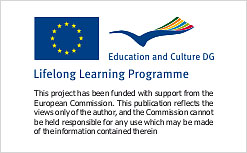

Chemistry is all around us
Copyright 2015
This project has been funded with
support from the European Commission
Database
Reviews of Publication
Homepage > Database > Reviews of Pubblication
Attitudes toward Chemistry among 11th Grade Students in High Schools in Greece
Salta, Katerina; Tzougraki, Chryssa
(Department of Chemistry, University of Athens)
Publication in the international Journal “Science Education”
English
This study reveals that the 11th grade students’ difficulties with chemistry lessons are related to concepts, symbols and problem solving. Students find difficulties in the use of chemical symbols and the application of chemistry concepts such as atom, molecule, mass, volume and mole. The application and use of chemistry concepts and symbols depends on the students’ ability to transfer from the macroscopic to symbolic level and from the symbolic to microscopic level and vice versa. In the same study, it is also shown that students also have difficulties in solving chemical problems which require mathematical skills.
In addition, this study indicates that students have a neutral attitude regarding the interest of the chemistry course. It is noted that some of the reasons that form such attitude are related to the content of chemistry curriculum, the limited amount of chemistry lessons time (one hour per week), the methods of teaching chemistry in Greek schools and the lack of laboratory experiments. In Greece, chemistry is usually taught theoretically without hands-on activities and this practice decreases students’ interest for chemistry lessons. The majority of Greek students tend to recognize that chemistry knowledge is useful for interpreting aspects of everyday life, but only few of them (about 4%) express the wish to study chemistry at University. It is hopeful however that most students believe that chemistry contributes in solving environmental problems and improves our lives. Overall, Greek students have a more positive attitude regarding the importance of chemistry and negative/neutral attitude regarding the usefulness of the chemistry course, the difficulty and the interest. In that same study, gender differences were examined. It was shown that although there are no differences between boys’ and girls’ attitudes regarding the interest, usefulness and importance of chemistry, girls tend to express more negative attitudes regarding the difficulty of chemistry courses relative to the boys. It is possible that this is due to existing social stereotypes like “boys are born to be scientists or chemists”. The role of the media (books, films, TV programs, newspaper articles) which usually show male science figures is highlighted in the study.
Students’ difficulties and negative attitudes may be turning students away from broad chemical literacy of the sort that might induce a lifelong interest in chemistry. Research concerning attitudes reveals effective ways to enhance scientific literacy and consequently to promote life long learning
http://www3.interscience.wiley.com/cgi-bin/fulltext/108069558/PDFSTART
Dr. Katerina Salta
T.E.I of Ionian Islands
Researcher